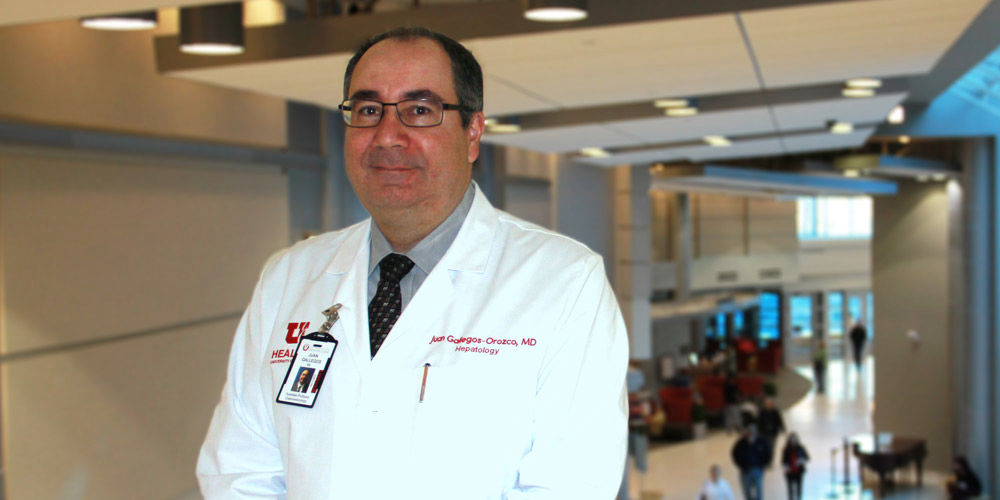Master The Art of Communication
As a palliative care provider and director of UACT, Joan Sheetz considers the art of communication a must in the health care environment.
UACT is offered to all University of Utah Health providers, residents, fellows and clinical staff. More info here.
osted by the Resiliency Center, UACT is a hands-on, interactive, all-day workshop that aims to expand the communication skills of health care providers and staff.
What I learned during the session
As a physician, it’s critical to think about the way that we communicate with patients and with each other. We learned how to prepare for difficult conversations—how to know what you want to accomplish before you go into a room.
My favorite portion of the seminar was the role-playing interactions with actors. Being put on the spot is not comfortable. It forced me out of my comfort zone and allowed me to see what other people think about the way I interact. Establishing a rapport with someone you don’t know in front of your peers adds a more natural dimension than just role-playing with somebody you already know.
What I learned (that I’m actually applying every day)
UACT helped me reflect on how I show patients I am listening. Since the training, I’ve placed extra emphasis on taking my time, sitting down when I visit a patient, being mindful of my body posture, and letting them speak while I really listen. These are actions that physicians don’t always enact. Although we might know that they are best practices, we don’t necessarily apply them every day.
I learned the critical importance of introducing everyone who is in the room to the patient. As an attending physician who supervises trainees, I make sure to present every member of the team to a patient and communicate clearly about what their role is.
The training has also helped with difficult conversations. Many of my patients have advanced liver diseases. They may be close to dying. So we have to talk about choices—I have to ask difficult questions. I ask patients how aggressive we should be in their care and the realities of a liver transplant.
Especially in encounters like those, letting the patient express themselves is important. I often catch myself before I start speaking or asking questions. I’ve also slowed down my explanations to allow time for patients to process the information. I explain why I’m recommending a particular procedure, and then I give people time to think about and absorb what I’ve said.
Perhaps that’s just talking slowly; perhaps it’s trying to avoid jargon; perhaps it’s reflecting a little on what the patient is saying; perhaps it’s trying to put myself in their position. That’s a work in progress for physicians over our entire lifetimes. I do think we get better as we get older.
What I learned as an educator
Even the smallest words matter—I now say “and” instead of “but.” I’ve always struggled with providing feedback to medical students, residents, and trainees. I don’t always explicitly say, “This is feedback time.” Instead, I say, “Here is what you did well—BUT these are things you can do better.” It’s the “but” instead of the “and.” I’m still working on that!
Over time, I’ve also learned that, to be a good speaker, you have to think about your audience. You have to tailor your language for the audience. That’s the only way to ensure your students and your patients understand what you’re trying to get across.
Would You Recommend UACT to a Trainee or Colleague?
We all need to improve our ability to communicate with each other, no matter what level of training you’re in. UACT helps you communicate better with patients and family members—it even helps in your personal life. I would encourage anybody even remotely interested in the communication workshop to sign up. It was very helpful, especially for those of us who trained more than a few years ago, when communication wasn’t part of our med school curriculum.
Juan Gallegos-Orozco
From pediatrics to palliative care, a common thread runs through physician Joan Sheetz’s career: effective communication. That explains how she ended up co-directing UACT — Utah Advanced Communication Training that focuses on tools to enhance patient and peer interactions.
Health care is full of high emotion—especially right now. Thankfully, there’s a simple framework we can follow to de-escalate with compassion. Hospitalist and UACT co-director Claire Ciarkowski introduces NURSE: a simple mnemonic for responding with empathy.
Mindfulness can be an act of healing and resistance for Black, Indigenous, People of Color who confront microaggressions as part of everyday life. Mindfulness educators and social workers Trinh Mai and Jean Whitlock provide three steps to build mindful self-compassion for BIPOC.
